- Home
- A. A. Attanasio
The Eagle and the Sword (The Perilous Order of Camelot Book 2)
The Eagle and the Sword (The Perilous Order of Camelot Book 2) Read online
The Perilous Order of Camelot
Volume Two:
The Eagle and the Sword
A. A. Attanasio
The Eagle and the Sword
published by Firelords Press
Ignite your imagination!
http://aaattanasio.com/
Second Edition
Copyright © 2013 A. A. Attanasio
ISBN: 9780983608424
First edition published by HarperCollins, New York: 1997
The Perilous Order of Camelot; bk. 2.
Library of Congress classification: PS3551.T74 Z24 1997
Cover Art:
Jaime Oria
[email protected]
http://xenophone.tumblr.com/
Arthur was cruel from boyhood, a horrible son,
a horrible bear, an iron hammer.
— Nennius
Contents
Preface
Prologue
Book One: Eagle of Thor
Chapter 1: Storm-Raiders
Chapter 2: Aquila Regalis Thor
Chapter 3: Melania of Aquitania
Chapter 4: Aelle, Chieftain of the Thunderers
Chapter 5: Merlin
Chapter 6: Ygrane
Chapter 7: Excalibur
Chapter 8: Kyner's Battle-Soul
Chapter 9: The Viper-Priest
Chapter 10: Morgeu the Fey
Chapter 11: The Gleeman
Chapter 12: Severus Syrax
Chapter 13: Wise Dog
Chapter 14: The Weapons Master of the Gods
Chapter 15: Keeper of the Dusk Apples
Book Two: Keeping the White Bird
Chapter 16: The Evil
Chapter 17: Magic against Evil
Chapter 18: Procession of Clouds
Chapter 19: Crowland
Chapter 20: Prince Bright Night
Chapter 21: The Hollow Hills
Chapter 22: The White Bird
Chapter 23: Child of the Sphinx
Chapter 24: Warrior’s Vow
Chapter 25: Play of Shadows
Chapter 26: Escape from the Hollow Hills
Chapter 27: In the Realm of Desire
Chapter 28: A Dream Has Wings
Chapter 29: Love Is First
Chapter 30: The Star Stone
Chapter 31: Along the Spirit Trail
Chapter 32: World of Light
Preface
Born of Uther Pendragon, king of the Britons, and Ygrane of Tintagel, queen of the Celts, Aquila Regalis Thor—Arthor—has grown to young adulthood unaware of his royal destiny. This is the first book in his story, in which the orphaned youth discovers himself, physically and emotionally, on his journey to Camelot.
The Dragon and the Unicorn, the volume that precedes this, recounts the magical events that culminated in Arthor's birth, and the following Prologue touches on the consequences of that story and the coming of Merlin.
Arthor, of course, is the eagle of this book's title: an apt symbol, this solitary lord of raptors, for the most solitary king of legend.
And the sword is the most famous sword of all—the blade that held darkness at bay for a generation of magic, chivalry, and peerless love.
Prologue
An angel stands atop a rocky summit in western Britain at noon on a summer day in this year of the Lord 490. To mortal eyes, he is invisible, his face a shaft of sunlight, robes bundles of wind stirring gorse on the higher slopes of the mountain. Yet in his eyes, nothing is hidden. He sees the stuttering flames of all living things. The dead and the unborn draw near his fire in a frail mist. The hosts of the forests flicker like stars before him, and under his gaze every sparrow strung on its thread of song is stitched brightly against the blue curve of heaven.
Patiently, the angel stares south over the rumpled land and watches the sea turning its pages on the Saxon Coast. He reads there the coming Dark Ages. Flat-bottomed boats slide off the sea and hiss onto sand, disembarking furious warriors in wolf pelts and cloaks woven from human scalps. The drums they beat have been stretched from the flesh of those they conquered, and their music is low and weighted as fog.
Directly in front of him, Roman ruins dot the landscape like crazed pieces of a shattered puzzle. Huddled within those skewed stone walls, thatch-roofed hamlets await unawares the torch of the coming invaders. Oblivious clerics cower in mud huts, miscopying Plotinus and Lucretius again and again. Only the blind eyes of broken statuary watch as grunting farmers drag crude plows across gravelly fields.
An ancient notch-stone stands among bluebells on a slope of the angel's mountain, a monument erected by a nameless Neolithic people who lived here before the Celts. It catches the light of summer noon and casts along its length crooked shadows that briefly spell words in a language none among the living remembers.
The angel remembers:
The truth of this dreaming world is the turning of the stars, and as the seasons return after long rest, this marks the land where dream returns to its native ground, truth. Here reigns the true ruler of these islands in memory and in promise. Great is the burden of this care.
The planet turns, shadows lengthen, and the ephemeral words smear away, not to return for another solar season.
The significance of what they say remains, and the angel directs his attention toward where the notch-stone points. Below, on a broad tableland backed by forested mountains and facing a deep river gorge, a fortress looms under construction.
This shall be the citadel belonging to "the true ruler of these islands"—if the promise of the angels comes to pass in this world. Much has yet to be accomplished for this dream to arrive at its native ground, and the angel stands atop this peak as mute witness to all that remains undone.
The river below and the sea beyond lift under the hooks of the moon and carry the long ships of Saxon raiders forward. These are warriors of the north tribes, who worship spirit powers other than the faith of angels. The Furor, their ardent war god, so passionately covets these islands that he has inspired his followers with murderous frenzy that the angels alone cannot hope to counter.
For the angels, there is no choice: To help stave the tide of the Dark Ages, they must fight. They fight to preserve their dream of truths yet to come, for their lofty cathedrals and city-states and glass towers of the future, for their nations of prosperity destined someday to defeat poverty and sickness and eventually even death.
This desire to exalt humanity to the stars drives them to keep on fighting. And to aid them in their struggle, they have found one ally alone, in the last place any would think to look: among the demons.
The demons call him Lailoken. Once an incubus fierce with hatred for all life, he now lives in human guise as the wizard Merlin. Empowered still with a demon's strength and cunning, he has learned love from the woman he once tried to rape: Optima, a saint whose womb received his demon energy and who, with the help of the angels, wove him his mortal body of uncertain age.
At this moment, as the angel gazes down from his peak, Merlin labors below with caliper and rod, serving as chief architect and builder in the construction of this modern stronghold.
Fifteen years have passed since the birth of the destined king and the construction of his castle begun. The demon-wizard has reached that dangerous time when, according to prophecy, he must deliver to the throne "the true ruler of these islands."
Fifteen years rhythm into dreaming. Merlin and his builders dream an age of peace and amber fields – while the Furor and all who defy the angels dream an aberrant beauty.
Those who hate cities and farms know as well as
angels that nothing is definite, no prophecy certain. Will Merlin remember this?
The angel sees the approach of Merlin's enemy, Morgeu the Fey, the sorceress who has sworn her life to destroying whatever the wizard builds. Under the angel's gaze, she appears as a smear of moonlight in the forest darkness.
Her physical body lies entranced far to the north in a cirque of magical stones veined with roots of tropical trees, dwarf shrubs of lime and orange that unfold their blossoms in the sun for the plunder of bees.
Glistening among the sweet flowers, bees fill the air with their mumbled joy. They lull the sorceress into a trance deep enough to unstring her wraith from flesh.
Distance is nothing to her now, and she drifts free as a thread of mist. She needles through pine beds and mighty coves of oak that remain dark even at noon, dark as the hidden places of thunder.
The angel sees that Merlin, absorbed in building the castle of his king, seems unaware of the approaching wraith. To all the world, and even to the angel himself, the wizard appears no more than a lanky old man with a forked white beard. A hawk's scowl imprints his haggard face, and his shoulders bow heavy with weariness.
Only Merlin's bent conical hat with its floppy brim and his dark cowl embroidered in crimson filaments stitched with alchemic signatures indicate his hermetic status.
How constraining and frail are mortal limits, the angel thinks, observing Merlin leaning heavily upon his gnarled staff as he moves among colossal stone walls. The angel knows well the dangers of these physical restrictions, for he, too, remains bound by the limits of his energy.
Having given everything to install Lailoken in a human body and transform him into Merlin, the angel does not retain enough energy to aid him further. Merlin must rely on his own resources now to establish his young king and hold back the minions of chaos.
Rising, the angel disappears in the wind. His shadow, cast across the hot day, unfurls rain in the clear sky and falls in widening veils.
Merlin wanders the construction site of Camelot in a mist of sunlight and soft showers and does not sense the angel that accompanies him.
This is the fifteenth summer that he has overseen the craftsmen and laborers toiling on the high plateaus and slopes above the verdant gorge of the River Amnis. He glows inwardly, well pleased with the curtain walls, ramparts, and towers that stand upon the emerald downs.
The city-fortress of his vision is nearly complete. It sprawls within a mountain cleft overhanging the river plain, protected by lordly crags to the west and north and open to a commanding view of the forests and alluvial fields in the southeastern lowlands. Red pantile roofs from the river hamlet of Cold Kitchen gleam like pieces of coral far below, where the old Roman highway meets the Amnis, but otherwise, the modern citadel hovers alone among the green and rocky tumult of creation.
Workers sitting on benches and stools under awnings and thatched canopies eating their midday meal of black bread, cheese, and leeks do not notice the shadowy blur in the sunny drizzle as Merlin strolls past. The wizard has made himself invisible to their eyes for this tour, the better to scrutinize their handiwork and oversee the intimate details of construction.
Ranks of Irish yews stand dwarfed before the imposing palisade wall. Atop the wall, archery platforms with lateral windows for enfilading fire assure that these defenses will forever remain unbreachable.
At the masons' work sheds, the wizard lingers, admiring the precision of the stonecutters' work: Most of the funds that Merlin has collected for building Camelot have gone to hiring the finest sculptors from Ravenna, the last practitioners of a dying art. They alone possess the arcane knowledge to construct Roman archways, domes, and vaults. Even the seemingly simple production of cement and squared stones has been forgotten in Europe by all save these few artisans. Under their expert direction, elegant spires arise from a clutter of wood scaffolds and hempen cables.
Merlin blinks up through the sun-shower at truncated towers. Soon enough, in a few more summers, balconies, bartizans, and belvederes shall appear atop this mighty edifice, and pennants and banderoles will fly regnant in the wind, displaying the royal colors of this land's true king.
That hope, which has consumed Merlin his whole life, spurs him to continue his supervisory tour. He boldly paces the flagstones of the spacious courtyard that someday will ring with the hooves of the king's cavalry. For the countless time, he surveys the surrounding bulwarks, their thick bases tapering to elegant parapets, and he envisions stables, barracks, and shops that will occupy the perimeter of this outer ward.
Already, carpenters have sunk the foundation posts for most of these structures. And there, discreetly recessed in the vallation, is the water main of tile pipes that feeds a sewer system of manholes and conduits. Merlin is proudest of this arrangement of pipes that he himself designed, which funnels water from the mountains to the living quarters with enough of an overflow for flushing latrines. Even the barracks and stables will have running water and self-cleaning commodes.
Satisfied with his architectural plans, the wizard directs himself toward the great hall, where the king will reside and conduct his court. For now, it is merely a wide circular wall of massive stones, roofless and empty within but for the workers' platforms and sheds. By summer's end, huge cedar timbers imported from Lebanon will cover the hall and large elliptical windows illuminate the enormous chamber with radiant slants of sun.
Merlin stands at the spot chosen for the dais, admiring the luminous and secure space he has designed for his king. As he reviews the numerous alcoves and arched niches designated for counsel-studios and scribes' nooks along the hall's circumference, a ghostly twist of light appears. It flits among the shadows of the masons' scaffolds.
At once, he senses the identity of this specter. Morgeu! He has not seen this witch in many years, yet he remembers with a groan her vehement magic.
He intones a spell that brightens the singsong of vendors hawking baked goods and fruit outside the great hall. And in moments, the construction site empties.
Merlin strikes his staff against a stone flag and makes himself visible. "I see you, Morgeu. Come forward! Come into the light and declare to my face why you disturb my work."
The vaporous figure edges closer and, when it touches sunlight, begins to shrink to firepoints clear as dewdrops. These sparks tighten and gather into the apparition of a tall, broad-shouldered woman in scarlet raiment. A halo of crinkled red hair flares about a lunar-pale face, whose small, dark eyes gaze with vibrant malevolence at the narrow wizard.
"I am come to tell you this, proud Merlin: what you build you build for me and the honor of my womb alone. No stooge of your choosing will occupy this great hall, for I shall assure that crows eat your eyes and dogs gnaw your bones before any king but my own sons Gawain and Gareth rule from this palace."
Merlin pretends to stifle a yawn and turns away, determined to hide his fright. Nothing he can say will ever dissuade Morgeu from believing that he was responsible for the death of her father, Gorlois, duke of the Saxon Coast. Since the duke's violent death, she has passionately devoted her life to mastering sorcery, to avenge herself against the wizard. So resolute is her wrath, she has even given herself bodily to the demons, risking both sanity and her very life to acquire supernatural powers equal to Merlin's magic.
"You needn't have troubled yourself to come all this way after fifteen years to tell me that, Morgeu." Merlin feigns disinterest by fully turning his back on her and pretending to study the master builder's plans on the easel where someday the king's throne will sit. Surreptitiously, he watches the reflection of her apparition in the shiny surface of the builder's bronze ruler. "I have not forgotten the great love you cherish for my demise. I thought perhaps you carried some news worthy of distracting me from my work. Now begone and trouble me no more with your wearisome ire."
Creeping closer, the enchantress intones hatefully, "When next we meet in flesh, Merlin, I will make you despair you ever dared assume human guise."
Morgeu waves her hands before her face to break the wizard's spell. "Enough! You think I am yet a child, enraptured by clever words?" She pulls her scarlet robes tighter, and her image shivers like flame. "I have not come here to partake of your madness, demon. I come to astonish you with my hatred and to taunt you with this promise: the son of Uther Pendragon will suffer before I kill him."
"No!" Provoked by this threat to his ward, Merlin lunges toward the apparition, his staff swinging in a wide arc.
Insubstantial as a mirage, the sorceress retreats before him, becoming again lunar mist, an ectoplasmic wisp, and then nothing.
The wizard's staff slices empty air and leaves him gasping as much with fright as exertion. His mesmeric spells had no effect on her.
No effect at all! he mulls and experiences distress so sharp and strange it seems to be happening outside of himself, as though his fear were a thing apart.
Merlin sags, lowering himself onto a worker's bench when the fright in him does not relent. The knuckles of his hand gripping the staff whiten. Morgeu has acquired the magical skills to fulfill her threat. She shares with the king their mother Ygrane's blood, and sooner or later that blood will draw her to her unsuspecting brother, no matter the wizard's obscuring spells.
He looks about at the enormous, round hall with its incomplete walls and empty windows, and wonders if the fifteen years of continuous planning and building have vainly raised a monument to his bitter strength alone.
Am I arrogant to believe that justice can reign in a world of fury? Am I mad?

 The Conjure Book
The Conjure Book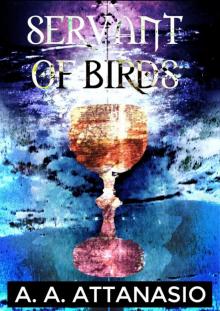 Servant of Birds
Servant of Birds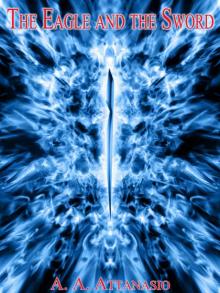 The Eagle and the Sword (The Perilous Order of Camelot Book 2)
The Eagle and the Sword (The Perilous Order of Camelot Book 2)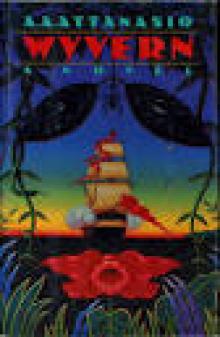 Wyvern
Wyvern The Last Legends of Earth
The Last Legends of Earth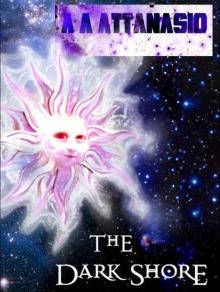 The Dark Shore (The Dominions of Irth Book 1)
The Dark Shore (The Dominions of Irth Book 1)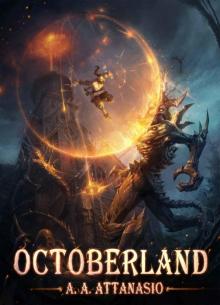 Octoberland (The Dominions of Irth Book 3)
Octoberland (The Dominions of Irth Book 3)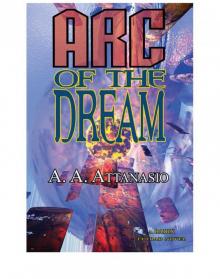 Arc of the Dream
Arc of the Dream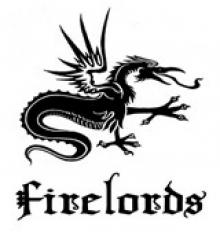 p1b6fn7sdh1ln0g4v1pkvkuqim54
p1b6fn7sdh1ln0g4v1pkvkuqim54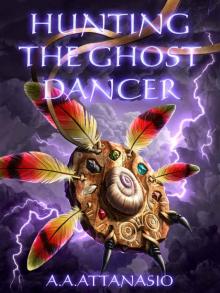 Hunting the Ghost Dancer
Hunting the Ghost Dancer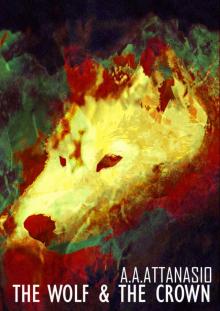 The Wolf and the Crown (The Perilous Order of Camelot Book 3)
The Wolf and the Crown (The Perilous Order of Camelot Book 3)